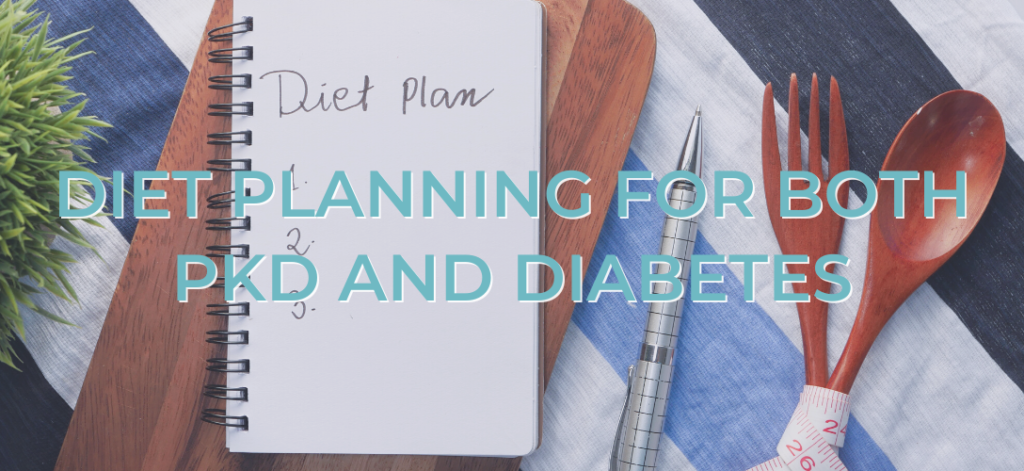
Published on August 2, 2022 | Planning meals and snacks requires extra effort when you have PKD. But if you have both PKD and diabetes, the process can be even more challenging. While a PKD diet and a diabetes diet overlap in many ways, the recommendations for each do conflict sometimes.
This can create a lot of confusion for people who need to control both conditions, says Shima Fazelimanesh, R.D., a nephrology and organ transplant dietitian based in Los Angeles. “Most of the clashes involve the advice for protein and carbohydrate consumption,” she explains. “It’s important to work with a dietitian because people who have PKD and diabetes need education to make the healthiest choices.”
The PKD-Diabetes Connection
Normally, having PKD doesn’t make a person more likely to develop diabetes (and vice versa), but that may not be the case for those undergoing a kidney transplant. A study in the journal Transplantation found that 6.5% of people with autosomal dominant PKD (ADPKD) who received a transplant developed new-onset diabetes after surgery. An additional 11% developed impaired glucose tolerance (pre-diabetes).
While more research is needed to confirm the link, Fazelimanesh says the risk is real. “We’re not sure why it exists, though in some patients it may be due to side effects of the drugs they need to take to prevent organ rejection,” she says. “These can interfere with the pancreas’ ability to produce enough insulin to manage carbohydrate and glucose intake properly.”
How to Balance Your Diets
If you have PKD and diabetes, these tips can help you navigate the areas where dietary recommendations conflict.
Focus on plant sources of protein.
Eating (lean) meat usually isn’t an issue for people with diabetes, but it can be a problem for those who also have PKD. “A plant-based diet is thought to be gentler on your kidneys, which may aid in the prevention of kidney disease,” Fazelimanesh says. Also, research in mouse models of PKD shows that limiting animal protein can restrict the growth of cysts and delay the progression of PKD. Good sources of plant-based protein include beans and legumes, quinoa, tofu, unsalted nuts, nut butters, and other seeds. Avoid processed meatless products such as veggie burgers; these contain a high amount of sodium, which both PKD and diabetes patients should limit. If you do want to eat animal protein, Fazelimanesh says eggs and fish are the best options for your kidneys.
Keep your protein intake in check.
Studies suggest that high-protein diets may be beneficial for people with diabetes, but they’re not a good choice for those with PKD too, Fazelimanesh says. In the early stages of the disease, eating just 0.6 to 0.8 grams of protein per kilogram of body weight may be recommended, while many high-protein diets advise eating double or triple that amount.
Combine carbs with healthy fats.
Eating whole grains is encouraged in both PKD and diabetes diets, but people with diabetes need to be more careful with their intake of carbs than someone with PKD because they cause the blood sugar to rise. “If you have both conditions, adding a heart-healthy fat to a whole grain can help keep blood sugar steadier,” Fazelimanesh says.
Examples include dipping whole-wheat bread in olive oil; spreading whole-wheat bread with natural peanut or almond butter and topping it with blueberries; or making avocado toast if your potassium levels are normal.
Choose produce wisely.
People with diabetes can eat most fruits and vegetables—even ones that are higher in natural sugar—but they may need to rely more on produce that’s low in potassium if they’re in the later stages of PKD. Fruits and vegetables with less potassium include apples, berries, broccoli, and peas. High potassium foods that may need to be limited include bananas, kiwis, avocados, and sweet potatoes.
When it comes to a healthy diet and nutrition, always discuss changes with your healthcare provider. They’ll help you create a plan that’s best suited to your needs. To learn more about nutrition, check out our resource library. And you can read more articles like this in the summer issue of PKD Life.









Simply keeping to regular mealtimes and consuming the healthiest foods in moderation constitutes a diabetes diet. A diabetes diet is a balanced, calorie- and fat-free eating regimen that is naturally high in nutrients. Fruits, vegetables, and whole grains are essential components. To know more visit https://healthsolutionblogs.com/category/medicine/
Hi Adrian, while your recommendation might apply to those with only diabetes, the purpose of this article is for those with both PKD and diabetes. Diet recommendations may overlap and also conflict with each other.
Type 1 diabetes, commonly known as insulin-dependent diabetes mellitus (IDDM), is a type of diabetes that affects sugar metabolism. It is caused by the development of autoantibodies such as islet cell antibodies and insulin antibodies against beta-cell antigens by macrophages and T-lymphocytes. It usually starts in children and young people. As a result, it is also called as juvenile diabetes. Furthermore, the incidence of type 1 diabetes has increased in the last decade, affecting the young generation’s quality of life.